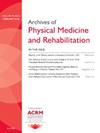Executive Function and Daily Living Skills in Young Women with Stroke
IF 3.6
2区 医学
Q1 REHABILITATION
Archives of physical medicine and rehabilitation
Pub Date : 2025-04-01
DOI:10.1016/j.apmr.2025.01.068
引用次数: 0
Abstract
Objectives
To examine cognitive challenges in young women poststroke, using a standardized survey.
Design
Survey.
Setting
General community/virtual setting.
Participants
Eight women aged 21-54 years old who had experienced a stroke. Population-based snowball sampling was used.
Interventions
Not applicable.
Main Outcome Measures
Daily Living Questionnaire.
Results
Results suggested that the cognitive skills most affected in this sample of young women after stroke are executive functions and executive function monitoring. Furthermore, the most frequently challenging tasks chosen from 52 daily activities included expressing thoughts and screening out background noises. Strong positive correlations were noted between 3 groups of variables: (a) between challenges in participants’ need and participants’ want to complete tasks in daily life, (b) between changes in participants’ responsibilities within their households and within their community/work, and (c) between changes in participants’ responsibilities within their households and general life changes since stroke.
Conclusions
This preliminary study brings to light the need to address cognitive challenges, especially executive function, in young women after stroke. This preliminary study builds the case for larger studies of a similar nature with more participants. It highlights a potential emerging area of occupational therapy practice that could become integral in traditional rehabilitation settings.
Disclosures
none.
年轻女性中风患者的执行功能和日常生活技能
目的通过标准化调查,探讨年轻女性脑卒中后的认知挑战。参与者:8名年龄在21-54岁之间的中风女性。采用基于人群的滚雪球抽样。InterventionsNot适用。主要结果测量:日常生活问卷。结果本组年轻女性脑卒中后认知功能受影响最大的是执行功能和执行功能监测。此外,从52项日常活动中选出的最具挑战性的任务包括表达想法和屏蔽背景噪音。三组变量之间存在很强的正相关关系:(a)参与者的需求挑战与参与者在日常生活中完成任务的意愿之间,(b)参与者在家庭和社区/工作中的责任变化之间,以及(c)参与者在家庭中的责任变化与中风后总体生活变化之间。结论:这项初步研究表明,需要解决年轻女性中风后的认知挑战,特别是执行功能问题。这项初步研究为更多参与者进行类似性质的大型研究奠定了基础。它强调了一个潜在的新兴领域的职业治疗实践,可以成为传统康复设置的一部分。
本文章由计算机程序翻译,如有差异,请以英文原文为准。
求助全文
约1分钟内获得全文
求助全文
来源期刊
CiteScore
6.20
自引率
4.70%
发文量
495
审稿时长
38 days
期刊介绍:
The Archives of Physical Medicine and Rehabilitation publishes original, peer-reviewed research and clinical reports on important trends and developments in physical medicine and rehabilitation and related fields. This international journal brings researchers and clinicians authoritative information on the therapeutic utilization of physical, behavioral and pharmaceutical agents in providing comprehensive care for individuals with chronic illness and disabilities.
Archives began publication in 1920, publishes monthly, and is the official journal of the American Congress of Rehabilitation Medicine. Its papers are cited more often than any other rehabilitation journal.

 求助内容:
求助内容: 应助结果提醒方式:
应助结果提醒方式:


